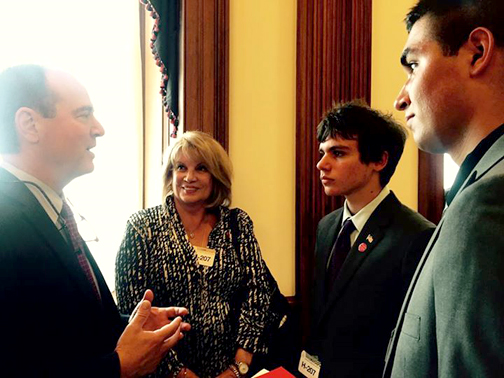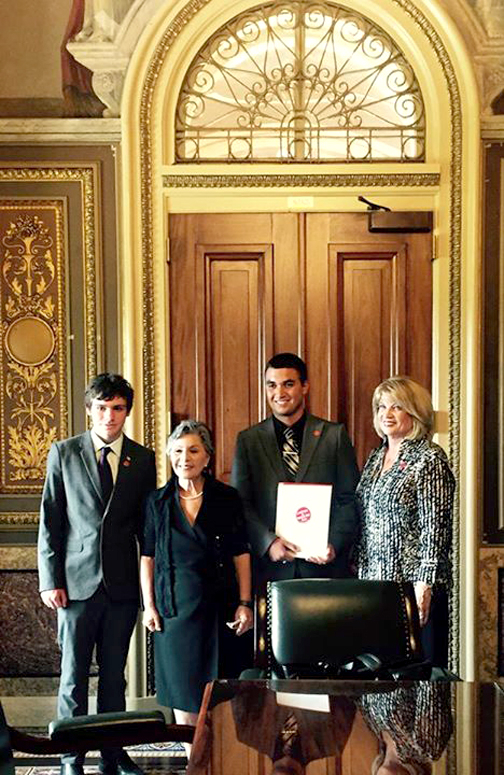
By Samantha SLAYBACK
The tobacco industry has been thriving for years by selling nicotine-based products to individuals across America including targeting its advertising tactics to a younger demographic. For these reasons, among others, individuals young and old have taken the fight against tobacco products into their own hands.
One individual, 16-year-old Sidney Hirshberg, recently attended a five-day program in Washington, D.C. run by an organization known as the Campaign for Tobacco-Free Kids. There he and 25 of his fellow youth advocates from around the country learned tobacco facts and skills on how to educate others.
“I was taught skills ranging from how to write a good letter to the editor to using the power of social media to spread our message,” shared Hirshberg. “Also how to lobby a senator.”

Though new to serious advocacy work, Hirshberg is very determined to make a difference when it comes to fighting the tobacco industry. Initially, he was intrigued to join the movement after seeing and hearing his aunt, Susan Liss, discuss the issues as a leader in the Campaign for Tobacco-Free Kids. However, there were numerous reasons why Hirshberg chose to become involved in the fight.
Hirshberg’s great-grandmother died of lung cancer at the early age of 42 after having smoked since she was 19. While he never got the chance to meet his great-grandmother, her son, Hirshberg’s great-uncle Jeff, was an important part of his childhood. For this reason, it was devastating for Hirshberg when his great-uncle died at 54, also of cancer, and very likely as a result of years of exposure to secondhand smoke from his mother.
“Smoking has had a devastating effect on my extended family,” said Hirshberg. “I was influenced by my Aunt Susan, [Jeff’s] wife, to help fight back, to try and ensure that others would not suffer in the same way.”
Aside from his first-hand experiences, he also felt compelled to get involved after seeing and hearing about the dramatic rise in the use of e-cigarettes, which has tripled over the course of the last two years.
Hirshberg admitted to seeing evidence of this common use of e-cigarettes while scrolling through Facebook on a daily basis. Pictures of his friends and their friends “vaping” are posted regularly.
“I see my friends using these e-cigarettes, and I fear for them,” said Hirshberg. “E-cigarettes are new technology; we do not know all the harmful effects that come with them yet.”
For this reason, Hirshberg wants to fight to spread the word that these, too, can cause serious harm.
His experiences in Washington equipped him with new skills and information to help fight for his cause. At the end of the five-day program, he and his fellow advocates were also given the opportunity to meet with their elected representatives, including Representative Adam Schiff and Senator Barbara Boxer.
While many parts of the program were beneficial, Hirshberg said the main benefit was the connections he made.
“I connected with numerous people, both fellow youth advocates and adults, from across the nation who are incredibly talented, committed and sdynamic people,” said Hirshberg. “I learned from them, soaking up their experience, so that I could use it in my own fight.”
As a result of these connections and the experience as a whole, Hirshberg said he feels that he is now ready to take the fight to his community, as well as California in general, and use his skills to help tackle the tobacco problems. For example, he noted that currently a measure is being debated in California to raise the legal smoking age from 18 to 21 years old. This measure has the potential to prevent 4.2 million early deaths, yet the tobacco companies are pushing hard to see the measure defeated, he said.
“The fight against tobacco is a fight that is far from over,” Hirshberg said. “I am fighting to stop Big Tobacco from targeting my friends, from drawing them into addiction, from suffering, and maybe even from an early grave.”

